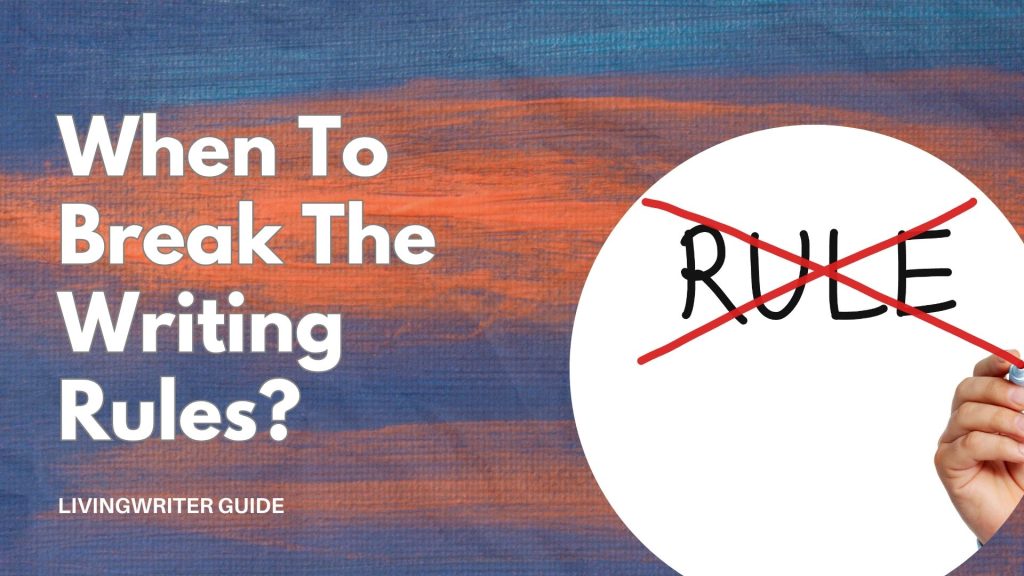Best Writing Rules And How To Break Them – Top 7

When it comes to writing advice, we hear plenty of rules for things we should and shouldn’t do. In general, these rules are good advice. But writing fiction isn’t always black and white, and sometimes there is value in breaking the rules. So, today I’ll be giving you seven of the best writing rules, a reason to break them, and how to do it well. Without further ado, let’s get started.
Table Of Contents
Every Character Needs Clear Motivation

Character motivation is a wonderful thing, and it’s a great rule of thumb to have an idea of why your characters would realistically be doing the things they’re doing. For example, what do they want and what are they willing to do to get it? With those questions answered, who would oppose them, and why?
Your character motivation is very important, but you can get away with breaking this rule, so long as it’s something you do on purpose. In real life, people do things all the time without truly understanding why, and you can use this to your advantage as a writer.
This can work well with unreliable narrators, ulterior motives, biased POVs, and other times when you can make a lack of a clear-cut motivation a plot point.
The Protagonist Beats The Antagonist

Most of the time, people follow this rule because it’s a satisfying, logical way to have the conflict resolved. That said, there can be great value in having someone other than the protagonist defeat your important characters.
Imagine you have a very powerful mob boss in your story who seems untouchable to his enemies. Instead of having some rival mobster take him out or the feds close in, maybe he dies in an unexpected, almost mundane car crash.
This works well for a few reasons. First, it flips the norm on its head and creates a memorable moment by being unspectacular. It also makes even the most formidable characters mortal and susceptible to unpredictable forces, which makes your story feel less like a predictable game and more authentic.
Start With Inciting Incident

With readers’ attention spans seemingly getting shorter and shorter, we’ve all heard that you want to get into something that grabs readers pretty quickly. Nine times out of 10, this is probably true. But there are times when you don’t have to start with your inciting incident quite so fast.
You May Also Like: Best Ways To Start A Novel – 8 Great Openings
So, when can you afford to slow things down, and when would you want to? Well, in longer books, you can go a little slower because you have more time. It can be good to do because you can really take your time establishing the voice or theme of your book. And honestly, many readers enjoy this as a break from the norm these days, which is to start fast.
If you do decide to break this rule, make sure you’re still talking about things valuable to the story (theme, voice, or world building) and be sure that you don’t wait too long. I suggest ending your “slow” section with a sentence that directly leads into the main plot or inciting incident.
You Can’t Have Scenes Without Conflict

Again, you hear this advice for good reason. Conflict does drive quite a bit of a plot, and more often than not, if a scene isn’t working well, it’s because of a lack of conflict. While all this is true, you might not want to create a world full of nothing but conflict.
Sometimes, it’s ok for a scene to be driven but something else – Love, thankfulness, forgiveness, etc, all of which can be incredibly powerful for readers, characters, and the plot. I do suggest, when possible, to still have the expectation of conflict, even if it doesn’t happen.
For example, someone tells someone else of their betrayal, and instead of getting upset, they forgive them unconditionally. For a deep dive into scenes and what makes them work, check out my article: How To Write A Scene – 10 Great Tips
Don’t Open With The Weather

If you asked me for a list of the worst ways to open a novel, talking about the weather would probably be on there. In most cases, it isn’t very relevant to the opening story and is usually pretty boring. Usually.
If the weather you’re talking about isn’t boring, say a volcano erupting, or a hurricane hitting, you’ll be off to a much better start. Next, it helps if the weather event is important to the plot in some way (like in The Grapes of Wrath) instead of being mentioned for no reason.
Characters Have To Change

I’ve preached this rule myself. Usually, you want your characters to react to the things happening to, or around them, and change for better or worse, as the plot unfolds.
So, when should you break this golden writing rule? Well, when an unchanging character is the point of the story. People are creatures of patterns, old habits die hard, and sometimes, we don’t learn the lessons we’re meant to. As long as it’s intentional, it’s ok for a character to end in the same place they began.
Always Advance Plot/Characters

These rules basically say that all your scenes should be either moving the plot along or developing your characters. Most of the time, this is true. After all, you don’t want chunks of the story not serving a meaningful purpose.
But, of course, there can be other meaningful things to do with a scene, too. Much like the conflict rule we mentioned above, it’s ok to step away from direct plot progress for things like theme, mood, or philosophical ideas.
Yes, when done correctly, all of these things will deepen the impact of the story on the reader… You’re never breaking away for something random. But still, it’s alright if you’re digressing from the main plot for something that does serve a purpose.
Writing With LivingWriting
Now all that is left to do is get out there and write. If you don’t already use LivingWriter for your novels, check it out via the link. Voted the best writing app of 2025 – From story outlines to more unique characters, LivingWriter helps you reach your full potential.
Conclusion
Breaking writing rules isn’t about being rebellious for rebellion’s sake. It’s about understanding the purpose behind the rule and then making a conscious, informed decision to deviate when doing so will strengthen your story and create a more unique and impactful reading experience.
What’s one writing “rule” you’ve successfully broken in your own work?